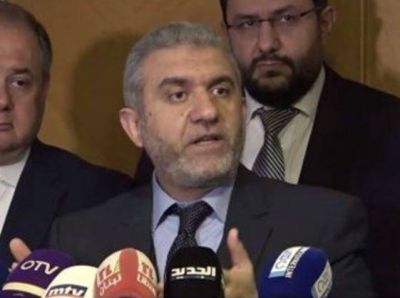
“Strike” is written on a sign attached to the gate of a public establishment. (Credit: Mountasser Abdallah)
BEIRUT — Several strikes paralyzed multiple sectors of Lebanon's economy on Monday while the president of the General Confederation of Workers — a national trade union center — called for a general strike to be held Feb. 8, L'Orient Today's correspondents and the state-run National News Agency reported.
These collective actions took place while the national currency continued its record depreciation.
The Road Traffic Department and the Car Registration Authority announced in a statement, "the closure of all its branches and divisions in Dekwaneh and the regions due to the continuation of the strike of its employees" until their financial conditions are improved, the NNA reported
The statement added that paying annual traffic fees and renewing biometric driving licenses "will continue on Tuesdays, Wednesdays and Thursdays," at the postal operator.
According to our correspondent in the North, companies such as Whish Money where one can settle ones auto mechanic transactions are struggling, with hundreds of car owners flocking to them to settle their car fees before the first of February, due to the fear of a price hike that would follow the decision to adopt LL15,000 as Lebanon's official lira-dollar exchange rate instead of the longstanding LL1,500.
Meanwhile, the NNA also reported that the judicial assistants in the North and Akkar governorates announced, in a statement, that "they will completely refrain from attending all court offices for a period of one week," starting Monday until Friday, inclusive, in the hope that their warning move "will resonate with those the strike is aimed at … that they have a sense of responsibility, and so that we do not have to regretfully extend the period of this work suspension."
This strike comes as a protest "against the unbearable living conditions and the deterioration of the purchasing power of the judicial assistant’s salary," as a judicial assistant's salary "has become equal to two canisters of petrol and perhaps less, and it has become impossible for the employee to attend [their job] regularly.” The judicial assistants also noted that no statement has been issued so far by their colleagues in Beirut and other governorates.
As for the public education sector, our correspondent in the south reported that teachers will maintain their strike — started on Jan. 10 — calling on Prime Minister Najib Mikati "to fulfill his promise … that he made two weeks ago," and demanding that he convenes a cabinet session to discuss and approve the demands of teachers and educators.
In their statement, the teachers also called on the education minister to suspend the school year until a cabinet session is held and "the necessary decisions are issued that fulfill the teachers’ demands and allow their return to schools."
Call for a general strike
General Confederation of Workers president Bechara Asmar called for a general strike to be held throughout Lebanon on Feb. 8 to protest the continued deterioration of workers' quality of life, especially following the record depreciation of the national currency and soaring fuel prices.
At the end of a meeting of unions and federations of road transport, Asmar said he regretted "the passivity of the executive" in the face of "soaring prices and the unstoppable depreciation of the Lebanese lira."
"Vehicle drivers can no longer buy fuel," he lamented, as 20 liters of gasoline now exceeds a cost of LL1,000,000.
"The executive board of the Confederation will meet on Wednesday, Feb. 1, and will announce a strike across the national territory for Feb. 8," said Asmar, noting that the road transport sector, teachers, the unions of public and private independent professions, and unions of liberal professions are all invited to participate in this strike.
The trade unionist assured the roads will not be blocked and called on the security forces to protect the demonstrators.
In recent years, the Confederation has organized several strikes to demand improved working conditions in Lebanon.
In addition to the depreciation of the national currency against the dollar — $1 equaled approximately LL 57,000 as of Monday afternoon — the unbridled rise in fuel prices has dealt a heavy blow to the population's purchasing power.
Additional reporting by Michel Hallak and Muntasser Abdallah

